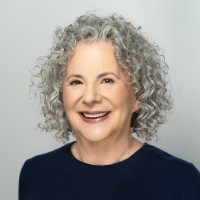Young people are our teachers – making intergenerational work
15 October 2024 By Guest writer Ronna Lichtenberg

Living in a multi-/ intergenerational world.
Young people are my teachers.
I didn’t think it would be this way.
When I reached 72, I thought I had learned a thing or two.
I went on YouTube as Granny Ronna because I believed I could be helpful to young people who needed virtual hugs, love, and advice. My idea was that I was a tribal elder, and that as such, I would be a life mentor. To be embarrassingly honest, I thought I would yammer away and young folks would be delighted to hear from a cool old lady like me.
Not so much.
For the last two years, I have been in multi-/ intergenerational learning school.
What I have found is that I am learning at least as much from younger folks (I have subscribers as young as age 13) as I thought they could learn from me. Probably more.
Following are five lessons I’ve learned.
1.Younger people are very giving, when approached the right way
One day, when I was on LinkedIn, I was reading a post by a GenZ influencer that included content from her on-line coffee dates. It sounded great except that I actually had no clue what she was talking about.
So I risked looking like an idiot and just asked her in a comment.
Within moments, I had a response about which app to use, when, and how. Also that I didn’t have to either drink coffee or provide a gift card for a dirty chai latte.
I think that ask worked for several reasons. The first is that I approached her as a professional. The second was that it was clear I admired her: Too often I think that “elders” convey a sense of superiority, whether justified or not.
And, of course, she wasn’t my grandchild or anyone else I bug with tech questions all the time.
2.If you think that new technologies mark the end of the world, you will be trapped in your own generational cohort. Your attitude about technology will limit your ability to learn.
In my boomer world, conversations tend to revolve around doctor’s appointments and downsizing.
If AI does come up, it is usually about how AI is terrifying and how my boomer friends want nothing to do with it.
I’m a generational outlier on this one. With AI, I am curious and on the side of the adventurers.
My experience is that when I talk to anyone from GenX on down about prompt engineering and applications, I can learn and share some pretty cool things.
One of my proudest moments was when I was able to use Claude (my current favorite LLM) to force rank potential colleges for my granddaughter along some very specific criteria, in just a few moments.
That gave us a new way to bond and it was fun for both of us.
Besides, my dream is that in my lifetime I will be able to outsource some additional personal memory storage to AI.
3.The wisdom of elders is helpful when it comes to any human problem ancient Greeks addressed.
Where I find experience is useful, and my young friends seem to agree, is that elders can be helpful figuring out life challenges that have to do with human nature.
As an example, my life’s work now is to help people with love and money.
Love and money are both powerful forms of energy:
They create value.
They destroy value.
They are really hard to manage successfully.
The cultural rules and agreements about love and money are fluid, and yet can be absolute within communities.
That kind of human complexity is where it helps to have the counsel of a tribal elder and where the opportunity to contribute knowledge to younger folks is welcome.
4.An effective multi-generational exchange requires specific conversational skills.
Unless you are in a culture where elders are respected in every circumstance, the rules of multi-/ intergenerational conversation have changed.
Younger generations, in my experience, have a keener sense of what consensual exchanges are all about.
Offering advice, finger shaking, or just ranting (Which I sometimes still do) makes it hard to listen.
Questions work.
As in:
What tools are you using to figure out what you do/don’t want to do?
How can you explain to me the challenge you’re experiencing?
Would it help you if I told you a story about something I went through that may be relevant?
Most importantly, remember to leave some open, quiet space.
If you do ask something, pause. Let it be still for a while. When you rush in with words, you lose the opportunity to learn.
5.And finally, and most importantly…do NOT tell them to put down their phone.
Young people intuitively know what they need for the world they will be living in. The older we are, the less we know.
Their virtual connections, and the way they communicate and learn, are preparing them for a world we won’t see.
What can work is for us to put down our phones, and invite them into the moment.
Who would resist a moment like “Is that not the most beautiful Monarch butterfly you have ever seen?”
When we are present, and present to everyone, of every stripe, there is a far greater chance they will be present for us as well.


